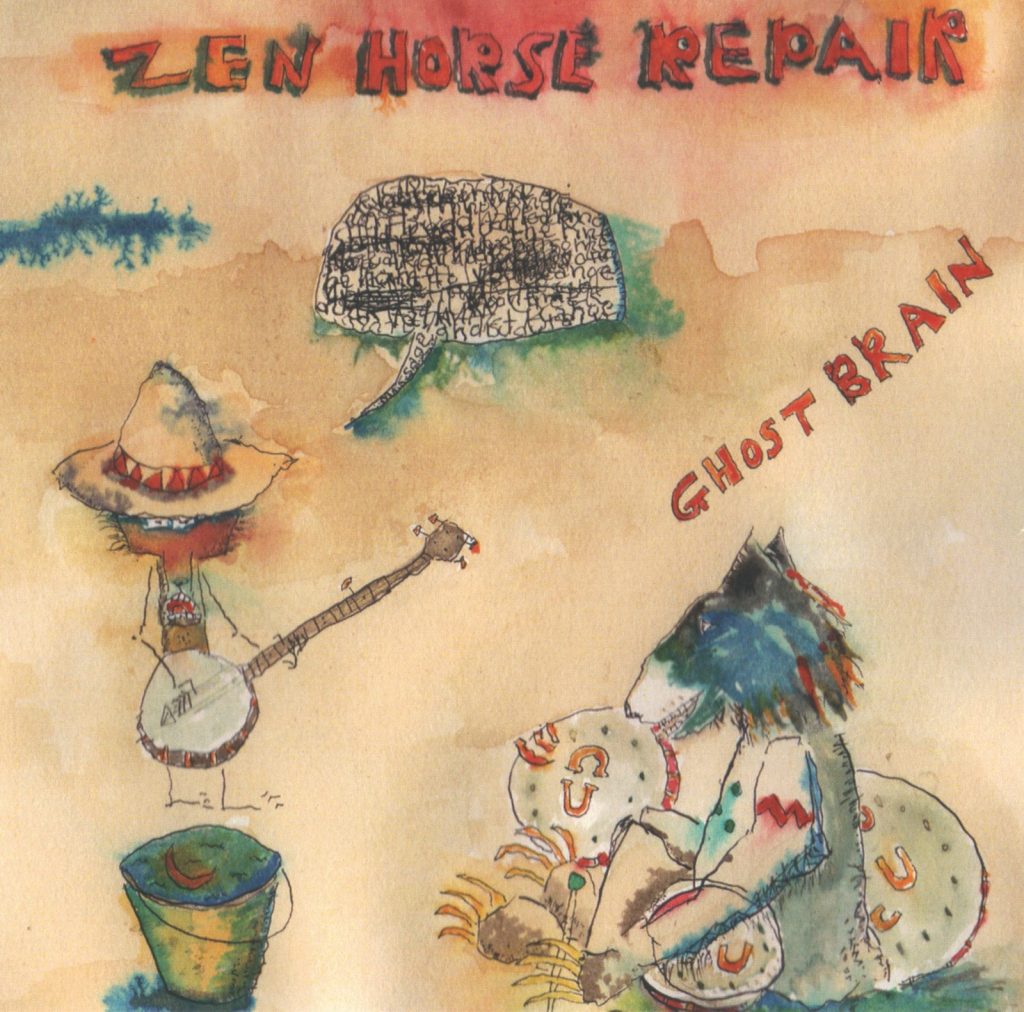Ghost Brain
Zen Horse Repair
Household Ink Records, 2008
$15.00 (CD)
“They write haiku in Fresno,” Neil Crosbie announces during the song “Fresno.” It sounds like a bit of a throwaway line, but Crosbie’s telling the truth: Fresno, a city in California’s Central Valley that might be mistaken for a series of parking lots, is also the unlikely home to a thriving writing scene. Zen Horse Repair’s new album, Ghost Brain, dedicates itself to finding poetry in similarly unexpected places. The band’s dreamy, winking songs pay equal dues to the dharma, Freewheelin’-era Bob Dylan, Tom Waits’s spoken-word cool, and a brand of eccentric humor all its own.
Tricycle readers may recognize Crosbie as the creator of the crafty cartoon coyote who is regularly seen in the magazine’s “Letters to the Editor” section. He’s also Zen Horse Repair’s lyricist and guitarist, sharing composition duties with drummer Tom Lackner. Ghost Brain is the group’s second album; their first, the self-titled Zen Horse Repair, was released in 2002. This is music to listen to while lying in the hammock on a late summer day or chopping vegetables for dinner: ruminative, kindhearted, and as chilled-out as homemade strawberry wine. Tinny banjos and Crosbie’s reedy twang reflect the band’s folk roots. Simple, catchy melodies are their mainstay, with the occasional flurry of recorders or mouth harp free-for-all thrown in to keep things interesting. (In the “Porch Song,” Lackner’s dotty xylophone lends a South American twinge to the otherwise bluegrass track; “Everything Be OK,” clocking in at just over a minute, features frogs croaking steadily and little else.) While the subjects of Crosbie’s songs tend toward the universal—moons, buddhas, women, grass—his lyrics often head off in unexpected directions. Like koans, they offer opportunities for listeners to follow a twisty path to fresh understandings.
“Moontime,” a rootsy duet with the sweet-voiced Vasanti Lackner, begins with strumming banjos, ukeleles, and an appealing refrain: “In the moontime, baby, we walked along.” Then the song expands to broader musings: “Now if as they say, one drifts through life meeting many enigmatic women / and as is commonly agreed, attention to time will get you nowhere / then it follows that we love wisdom for its own sake / and spend our evenings changing like the moon.” Ghost Brain is alight with this sense of possibility. Crosbie, observing a mallard duck or a girl walking back from the river, is alert to everyday opportunities for transformation—moments when “all the buddhas of the ten directions bow.” Yet Zen Horse Repair never takes itself too seriously; Crosbie adopts a fool’s persona, equal parts baffled and sly, always eager to turn a question on its head. He’ll talk about nirvana, but he’s got even more to say about the cicada, “the purest member of the insect world.”
While Ghost Brain is grounded in Buddhism, it bears little similarity to the type of spiritual music that features long-locked men in purple robes and excessive fluting. Zen Horse Repair is too strange and deadpan to provide a relaxing background for a hot-stone massage. “Slow Learner” makes languorous, offbeat bedroom music, with Crosbie crooning, “You’ve got something to tell me / Tell me more slowly / I’m a slow learner / Learning slow,” and sounding like a man who’s been around a few karmic blocks. In the darkly romantic “Canoe Song,” a growly Crosbie sketches a portrait of a natural world whose quiet grandeur reminds him of the quickly whirling clock of human life. “Sailing by the stars; there’s little here that’s ours,” he sings over a rippling keyboard, barely raising his voice. Though Zen Horse Repair’s songs often run up against emptiness and the ultimate void, their lyrics display the bittersweet acceptance that sometimes comes with age: “Enjoy the view.”
Ghost Brain is clearly a labor of love, from the delicate watercolor album cover (also by Crosbie) to the fine-tuned thwacks and rattles that pepper each track. Where such projects might fall prey to solipsism or self-congratulation, this album heads in the opposite direction, spreading a contagious warmth. For Zen Horse Repair, each song seems to represent a new chance to reach out and connect with listeners. The drowsy, welcoming “Harmonica Virgins,” which opens the album, sets the tone for what’s to come: a wistful harmonica, a melody that swoops and dips like a low-flying water bird. “Our conversation sort of swims, afloat in the sky,” Crosbie sings vaguely. It’s easy to picture him lying down and looking up at the sky, head propped comfortably in his hands—and surprisingly easy to picture yourself beside him
Thank you for subscribing to Tricycle! As a nonprofit, we depend on readers like you to keep Buddhist teachings and practices widely available.
